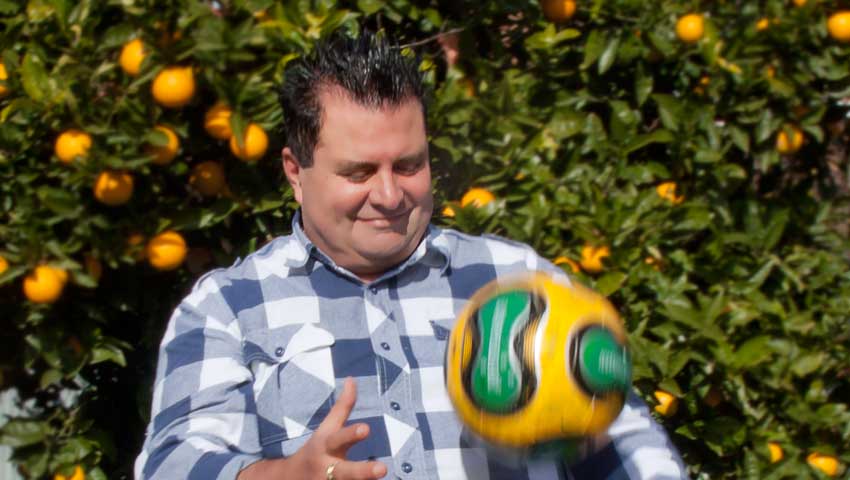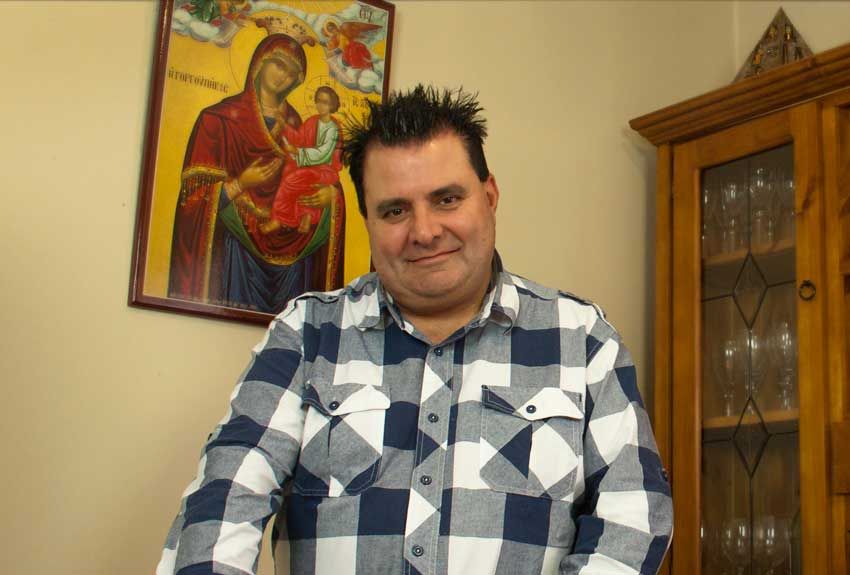Evan 'has always wanted help other people', says his wife, Tammy. ‘And this is what he's doing now – he touches many lives.’
Evan's job is to help give a voice to people with mental illness who come from non-English-speaking backgrounds. His formal title is 'Culturally and Linguistically Diverse Mental Health Consumer Advocate'. He and five colleagues, whom he mentors, talk to people affected by mental illness in ethnic communities about their experience and how they can be helped better. They also give talks to local social and sporting groups to raise awareness of mental health issues.
Evan was born in Egypt. The family migrated to Australia when Evan was six and he grew up speaking Arabic and Greek (his mother's tongue) as well as English. After a happy childhood, life changed for Evan in his late teens.
‘I started to giggle and laugh a lot and did not want to interact with people socially,’ he says. ‘I also became paranoid, thinking people were following me and that my thoughts were being broadcast.’
Evan's parents realised something was wrong and turned to their Greek Orthodox priest for help. He prayed over the young man.
After a while the symptoms became more severe and Evan's parents took him to their family GP, who said it was mild 'nerves', and put him on sedatives. This made no difference.
‘My parents were confused and worried,’ Evan says. 'Their English wasn't as good as mine and they didn't know what to do. Eventually they took me to a hospital emergency department, and I was admitted to the psychiatric ward for three months.’
He was told he had Schizophrenia – but that it was an illness which could be treated.
‘Doctors can provide medication. They can give you recreational activities and advice. But the desire to get better has to come from you.’
Evan educated himself about his Schizophrenia, took his medication, made an effort to stay socially active and eventually married and had two children. While that relationship ended after twenty years, he has since met Tammy and the two have been married for five years.
‘My mum got me back to the Greek Orthodox Church after a long break, and there I met Tammy, who not only shared the same interests, background and beliefs, she also had Schizophrenia.’
‘I found him kind, gentle, quietly spoken and caring,’ Tammy says. ‘I fell in love with him.’
‘It was a double bonus: someone who understood the illness and someone who shared my beliefs and values.’
Tammy and Evan also watch out for each other. ‘We understand each other's symptoms when they flare up,’ he says.
Tammy takes special note of the times Evan is tired, restless and flat. ‘I tell him he has to look after himself, that work can wait,’ she says. ‘It's quality that matters.’
Evan admits he has a tendency to do too much, as his work has become a passion.
He was studying for a science degree when he first became ill and his goal was always to do work which would help others. He never finished the course but he has achieved his dream in other ways.
Today he helps other people experiencing the baffling and often frightening symptoms of mental illness – and provides an example to show it is possible to come out the other side, to manage them, and to be happy.

As well as his work with ethnic communities, Evan writes articles for the media and speaks on SBS radio, highlighting the availability of interpreters for people concerned about mental health problems when talking to health professionals or helplines.
He is well aware that ethnic families, although strongly supportive of each other, often lack confidence in speaking English and may not understand the importance of early intervention with mental illness.
Evan also sits on a number of boards and committees including the Royal Australian and New Zealand College of Psychiatry (RANZCP), Victorian Mental Illness Awareness Council, and Advocacy Disability for Ethnic Communities (ADEC). He runs statewide mutual support groups for people with mental illness as well as a local group called Spectrum of Cultures. Yet another role is conducting community education classes for GPs.
Now in his 50s, Evan has returned to study and is doing a Leadership course linked to the RMIT Community Development Diploma at RMIT University. Evan has also completed a Certificate IV course to educate himself on how to deal with people with all kinds of disability.
To bring some balance into his life, Evan power-walks, reads, gardens and enjoys Zumba dancing exercise classes in his 'spare time'. He has been a soccer coach and a well-known referee for Soccer Australia for many years.
Tammy's love and support have transformed Evan's life but the success of his work is deeply rooted in his personal determination to find healing through what he calls self-advocacy.
‘Self-advocacy is about learning to stand up for yourself before you can stand up for others,’ he says. ‘It is about building your confidence and self-esteem. It takes time.’
As Evan knows from his own experience, it does take time but he is a sterling example of how it is possible to get there, happily and well, in the end.











